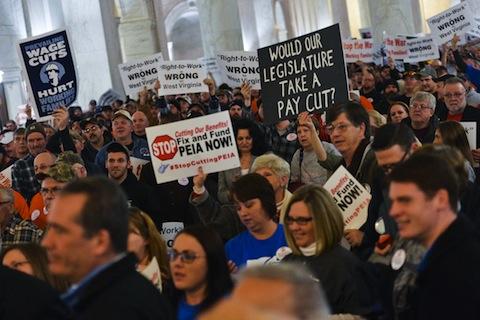Eleven state labor unions filed petitions in Kanawha Circuit Court Monday challenging the state’s new “right-to-work” law as an illegal taking of union property and resources.
“First and foremost, it’s unconstitutional because it’s an illegal taking of property without due process,” said Josh Sword, secretary treasurer of the West Virginia AFL-CIO, one of the 11 plaintiffs.
The lawsuit, and a motion for a preliminary injunction to block the law from going into effect July 1, contends that the Workplace Freedom Act (SB 1) is intended to discourage union membership by “enabling nonmembers of unions to get union services for free.”
Vetoed by Gov. Earl Ray Tomblin, but enacted into law by override votes with no Democratic support in the Republican-controlled House of Delegates and Senate, the legislation allows employees in union shops to opt out of paying union dues.
“Requiring unions to provide services to free riders while simultaneously prohibiting unions from charging for those services necessarily takes union funds and directs them to be expended on behalf of third parties,” the lawsuit states.
The lawsuit contends one intent of the law is to discourage employees from joining unions.
“Why, the employee would ask, should I pay for something that the law requires be made available to me for nothing,” the petition states. “Such a circumstance would — naturally and predictably — seriously burden a union’s ability to recruit and retain members.”
In April, a Wisconsin circuit court judge overturned that state’s right-to-work law in a case that similarly argued the law amounts to an unconstitutional taking of union property and resources. That ruling has been stayed, pending an appeal to the Wisconsin state Supreme Court.
“This is ultimately going to go to the U.S. Supreme Court, without question,” Sword said of the challenges to right-to-work laws. “The general question of whether it’s an illegal taking of property without due process will be ultimately decided by the U.S. Supreme Court.”
The petitions filed in Kanawha Circuit Court also contend the right-to-work law “casts a blunderbuss shot at the plaintiffs’ ability to associate with employees to advance workers’ causes.”
It compares the right-to-work law with laws passed in Southern states in the 1950s as part of the massive resistance to the U.S. Supreme Court’s desegregation orders in Brown v. Board of Education, with legislation intended to discourage membership in the NAACP — laws that were ultimately overturned in court for violating 1st and 14th Amendment rights of free expression and association.
The petition also cites other issues with the right-to-work law, including a definitions section that seems to limit the law to public employee unions, and an error in the bill’s title that could render it unconstitutional.
“We’ve done our research and feel that we have a very strong argument on a number of different levels,” Sword said.
Although the 11 unions filed separate petitions, union attorneys Vincent Trivelli and Robert Batress also filed a motion to consolidate the petitions into a single lawsuit.
“It’s not unexpected. It’s a typical playbook thing to do,” he said of the lawsuit, adding, “When the bill was passed, the comment was: Lawsuit to follow.”


Spread the word